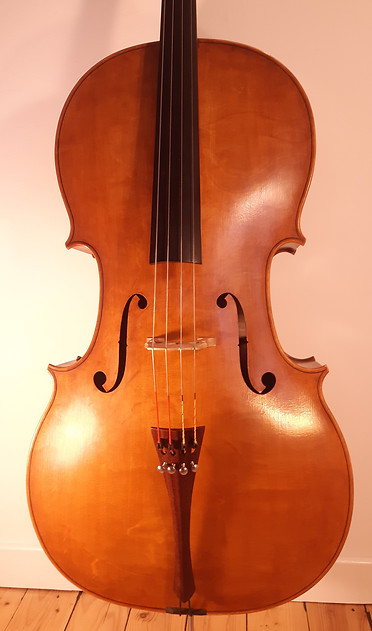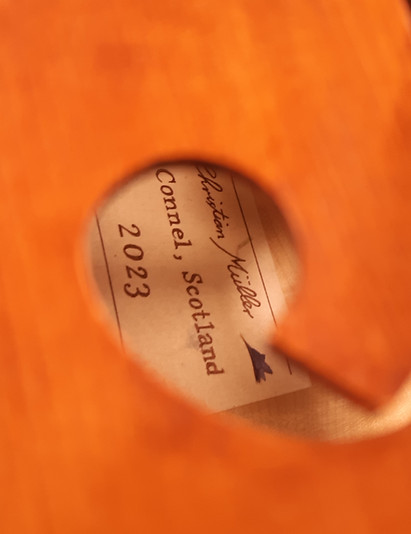Instruments
My aim is to handcraft instruments which will be loved by their new owners.
The most important factors for a successful instrument are a pleasant, well balanced sound, easy and pleasant handling, the aesthetic appeal and last but not least a good workmanship and material selection to ensure the longevity of a heirloom instrument.


Instrument Handling
The instrument necks are shaped very evenly and smoothed thoroughly, while the transition to fingerboard and nut can hardly be felt. But if you like the neck having a slightly different shape, this can be adjusted within certain limits.
The action (strings height) is adjusted so that most players feel comfortable with it, but again if you are buying an instrument, I can also adjust it to your personal preferences.
The pegs are fitted such that tuning is easy, but replacing them by geared models or adding more fine tuners to a tailpiece would be no problem at all.
A chin rest is one of the easiest parts on a violin to replace. So it can be swapped with almost anything you prefer.

Sustainability
I can offer more sustainable material options for fingerboards and fittings, such as Sonowood, Rocklite, Corene or less endangered wood species such as siris as an alternative for rose wood.


Tuning & Sound Adjustment
To give the instrument the potential for a pleasant, well balanced and well projecting sound, I'm using an established method (plate tuning), where the front and back plates are gradually and selectively reduced in thickness to achieve certain relationships between the vibrational modes and tap tones (natural frequencies) of the free plates.
But even the best instrument cannot sound well, if the set-up is not carried out very cautiously, i.e. right sound post and bridge position and fit.
But there are also many other factors that can have an effect, such as bridge weight distribution, bridge stiffness, string tensions just to name a few.

Materials
All materials are very carefully chosen, such as well seasoned, light, but stiff spruce for the front plate, and maple or sycamore for the "rest" - back, ribs and neck.
To enhance the nice look and to protect the wood of your instrument, I'm using varnish systems made by well established manufacturers along with well established processes to prevent a mid-term deterioration of the varnish.
Very good quality fittings are used as it will make your handling of the instrument easier and will also enhance the instruments reliability.

Aesthetics
At the moment I keep close to the instrument outlines, archings and scrolls created by "The Old Italian" makers, because I think they are just beautiful as they are. But I don't intend to make exact copies and I add my personal note here and there or might even carve a Guarneri scroll onto a Stradivari model.
To create a beautiful appearance of the instrument, I usually choose maple or sycamore with a deep figure along with a very transparent finish, which enhances the wood figure beautifully by keeping its "holographic movement" and "sparkle".
If you are interested,
don't hesitate to get in contact with me, or one of my dealers.
My instruments are for sale at
-
Tim Wright Fine Violins (Edinburgh) or
-
directly from my workshop.
Please get in contact before your visit to check availability of instruments.
Prices of my violins are in the range of £3000 to £10000.
There is no obligation to buy anything when you visit my workshop as I understand how difficult it can be to find the right instrument that meets all your requirements.
But as mentioned above, many parts of an existing instrument can be easily adjusted and we can also discuss any of your requirements for a custom made instrument such as different types of wood, finishing or various extras.

Examples of my Instruments
Violin based on Stradivari "Viotti" 1709 (SOLD)








Violin based on Stradivari "Viotti" 1709 (AVAILABLE)




Violin based on Guarneri del Gesù "Vieuxtemps" 1741 (SOLD)





Violin based on Amati "Alard" 1649 (AVAILABLE)





Cello based on Stradivari B-Mould (SOLD)





